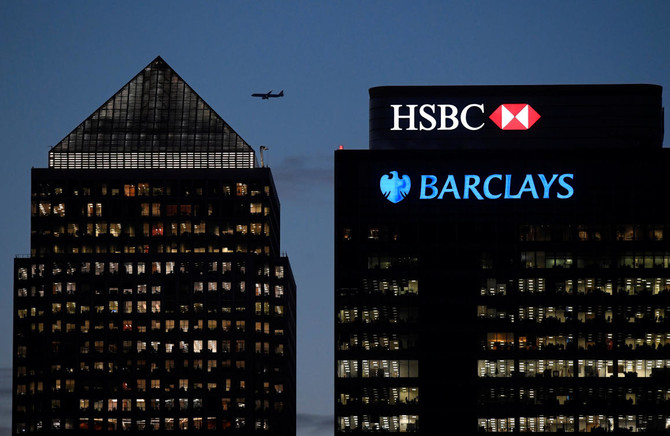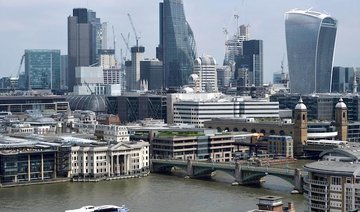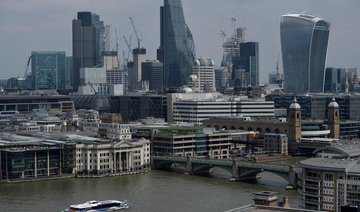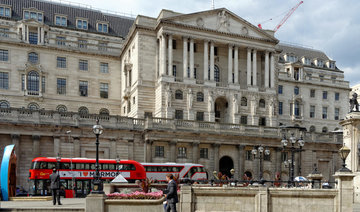LONDON: Will Britain’s decision to leave the EU in 2019 damage one of its most successful industries?
The financial services sector, which accounts for about 12 percent of Britain’s economic output and pays more tax than any other industry, potentially has a lot to lose from the end of unfettered access to the EU’s post-Brexit market of 440 million people.
Known for centuries as “the City,” London’s financial center has expanded beyond its original heartland in the City of London to the skyscrapers of Canary Wharf in the east and plush townhouses in Mayfair to the west. The British capital dominates global foreign exchange, and features international bond and fund management operations and more banks than any other hub.
But it is particularly vulnerable to a Brexit shock, because about a third of the transactions which take place on its exchanges and in its trading rooms involve clients in the EU.
This has led some politicians and economists to predict London will lose its pre-eminence as a financial center after Brexit, although supporters of leaving the EU say Britain will benefit over the long term by being able to set its own rules.
Reuters has created a tracker to monitor six indicators to help assess the fortunes of the City, taking a regular check on its pulse through public transport usage, bar and restaurant openings, commercial property prices and jobs.
“At the beginning it is difficult to assess the true impact of what is happening because it is quite a confused picture,” said Tom Kirchmaier, a professor who focuses on banking at the London School of Economics. “These proxies will help you piece together what is going on.”
Almost 17 months after Britons voted to leave the European Union, our indicators suggest signs of a slowdown, but no transformative decline.
Commercial property Reuters obtained property data from Savills and Knight Frank, two of the biggest real estate firms in Britain. Savills says it calculates the value of property based on all-known property deals within the City of London area. Knight Frank’s data comes from landlords, developers and agents.
According to Savills, commercial property prices in the City of London have dropped more since the Brexit vote in June 2016 than at any point since 2009, the last year of the global financial crisis.
The price of renting real estate in the City of London district has fallen by about 5 percent since last year, dropping to 73.4 pounds per square foot at the end of September, from 77.6 pounds, Savills says.
However, leasing activity in the City of London was 17 percent above the long term average in the first three quarters of 2017, Mat Oakley, Savills’ head of European commercial research, said.
In Canary Wharf, prices are unchanged compared with last year, Knight Frank says.
Oakley at Savills says that for the first time since the global financial crisis the finance and banking sector is “out there looking for new office space” in the former docklands.
Going Underground Every weekday more than 200,000 journeys are recorded at the two main underground stations — Bank and Monument — that serve the City, making the stations among London’s busiest.
To find the number of people using these two stations and the underground station at Canary Wharf, Reuters filed Freedom of Information Act requests to Transport for London, which runs public transport.
The number of people using Bank and Monument stations is on course for its first fall since the final year of the global financial crisis, Transport for London data shows.
Travelers going in and out of Bank and Monument fell by 2.7 percent in the first eight months of 2017 compared with 2016. This follows an annual increase each year since 2009.
In Canary Wharf, the number of people using the station continues to rise. But the pace has slowed and in the first seven months of this year grew at its second slowest since 2009, Transport for London data shows.
A spokesman for Transport for London said a multi-year project to expand the capacity at Bank station began at the end of 2015, resulting in the occasional closure of some escalators, but this has not resulted in any reduction in the number of trains running.
Reuters also filed a Freedom of Information Act request to the City of London Corporation to find the number of new premises who have applied for licenses to sell alcohol and license renewals this year.
So far, Brexit seems to be having no impact here. The number of venues, such as bars and restaurants, applying for new licenses to sell alcohol in the City of London in the first eight months of 2017 is at a record high, data from the municipal local authority that runs the district shows.
Officials at the City of London Corporation say this is partly because the area’s night life has diversified in recent years, and no longer just caters to finance workers.
“We have a safe City with an expanding night life,” the Corporation said in a statement.
London City Airport The number of people using London City Airport, favored by executives for flights to European cities and beyond, faces its slowest increase in five years, according to its publicly available passenger figures.
The airport, close to Canary Wharf’s financial district, had an increase of 0.9 percent in passengers in the first six months of this year. That compares with an average annual 10 percent increase in the previous four years.
London City Airport said that it has enjoyed record growth since 2012, but its capacity is being constrained at peak times and it is looking to expand.
Hiring numbers
The number of available jobs in London’s financial services industry this year has fallen the most in five years, recruitment agency Morgan McKinley says.
Morgan McKinley focuses on hiring staff in the finance industry. It says it bases its number on the overall volume of mandates it receives to find jobs; it then applies a multiplier based on its market share of London’s finance industry.
The recruiter found 51,922 new financial services jobs were created in the first seven months of this year, a 10 percent drop compared with the same period last year. This was the lowest number of jobs available since 2012.
“Businesses are naturally hesitant to plan and execute growth hires due to the uncertainty around Brexit,” said Hakan Enver, a director at Morgan McKinley.
Jobs leaving London? Around 10,000 finance jobs will be shifted out of Britain or created overseas in the next few years if the UK is denied access to Europe’s single market, according to a Reuters survey published in September of firms employing the bulk of workers in international finance.
Sam Woods, a deputy governor of the Bank of England who has reviewed the contingency plans of more than 400 banks and financial firms, said he agreed with the findings of the survey.
The findings suggest that the first wave of job losses from Brexit may be at the lower end of estimates by industry lobby groups and firms, which could mean London will keep its place as the continent’s top finance center, at least in the short term.
“Your survey seemed to be about right,” Woods said.
Brexit and the City: taking London’s financial pulse
Brexit and the City: taking London’s financial pulse

EU states give final endorsement to AI rules

- The EU says the law will protect citizens from AI’s dangers while harnessing the technology’s potential in Europe
RIYADH: EU states on Tuesday gave their final backing to landmark rules on artificial intelligence that will govern powerful systems like OpenAI’s ChatGPT.
The European Parliament had already approved the law in March and it will now enter into force after being published in the official EU journal in the coming days.
The EU says the law will protect citizens from AI’s dangers while harnessing the technology’s potential in Europe.
First proposed in 2021, the rules took on greater urgency after ChatGPT arrived in 2022, showing generative AI’s human-like ability to produce eloquent text within seconds.
Other examples of generative AI include Dall-E and Midjourney, which can produce images in nearly any style with a simple input in everyday language. The law known as the “AI Act” takes a risk-based approach: if a system is high-risk, a company has a tougher set of obligations to fulfill to protect citizens’ rights.
There are strict bans on using AI for predictive policing and systems that use biometric information to infer an individual’s race, religion or sexual orientation. Companies will have to comply by 2026 but rules covering AI models like ChatGPT will apply 12 months after the law becomes official.
Pledge
The world’s leading companies pledged at the start of a mini summit on AI to develop the technology safely, including pulling the plug if they can’t rein in the most extreme risks.
World leaders are expected to hammer out further agreements on artificial intelligence as they gathered virtually to discuss AI’s potential risks but also ways to promote its benefits and innovation.
The AI Seoul Summit is a low-key follow-up to November’s high-profile AI Safety Summit at Bletchley Park in the UK, where participating countries agreed to work together to contain the potentially “catastrophic” risks posed by breakneck advances in AI.
The two-day meeting — co-hosted by South Korea and the UK — also comes as major tech companies like Meta, OpenAI and Google roll out the latest versions of their AI models.
They’re among 16 AI companies that made voluntary commitments to AI safety as the talks got underway, according to a British government announcement.
The companies, which also include Amazon, Microsoft, France’s Mistral AI, China’s Zhipu.ai, and G42 of the UAE, vowed to ensure safety of their most cutting edge AI models with promises of accountable governance and public transparency.
The pledge includes publishing safety frameworks setting out how they will measure risks of these models.
Saudi Arabia is a model of sustainable aviation practices: ICAO official

RIYADH: Saudi Arabia is a “model” for sustainable practices in the aviation section, said president of the International Civil Aviation Organization Council.
In an interview with Arab News during the Future Aviation Forum in Riyadh, Salvatore Sciacchitano emphasized the Kingdom’s position as an emerging leader in sustainable aviation.
Speaking about the global agenda to reduce carbon emissions, Sciacchitano said: “Saudi Arabia is in this sense a model because their plan of development is in the perspective of sustainability. This is very positive.”
“They have projects for low-carbon emission fuels. That means fossil fuels but to produce reduced emissions thanks to green energy that is used for the production. So this is a good direction,” he added.
The ICAO official highlighted the importance of adhering to international standards and practices, saying that Saudi Arabia’s aviation growth aligns with global standards.
He stated: “The regulations are there, we call SARPs, standards and recommended practices, these are applicable all over the world to all 193 (member) states of ICAO.”
Highlighting the role of the Kingdom’s General Authority of Civil Aviation, Sciacchitano praised the support of the authority to the Regional Safety Oversight Organization, which is a way to put resources together at the regional level.
“Let me say that the GACA is well advanced in terms of programs, projects, training, and also providing support at (the) regional level,” he said.
“In this sense, Saudi Arabia is well prepared, not just to support its own development, but also to support the development of the region,” he added.
Sciacchitano said ICAO is there to support its member states. Although he believes that the Kingdom is fully capable of achieving its goals independently. “We absolutely support them with our expertise,” he added.
Sciacchitano predicted a significant increase in global air traffic, with the number of passengers expected to reach 11.5 billion by 2050, up from the current 4.6 billion.
He emphasized the need for technological advancements to accommodate this growth, stating that technologies will allow the world to accommodate more airplanes in the air and more space on the ground.
Pakistan approves petrol, diesel supply deal between Aramco, GO Petroleum

KARACHI: The Competition Commission of Pakistan has granted a time-bound exemption on relevant clauses of a product supply agreement between Saudi oil giant Aramco and Gas & Oil Pakistan Ltd., known as GO Petroleum, for the import and sale of petrol and diesel products to Pakistan, the CCP said on Tuesday.
Aramco Trading Co. Fujairah FZE Ltd. is one of the world’s largest integrated energy and chemicals companies, while GO Petroleum is an oil-marketing company registered in Pakistan that operates a network of retail outlets across the country that sell petrol, diesel and lubricants.
Under the agreement, ATC Fujairah intends to meet GO Petroleum’s demand for essential petroleum products for its outlets, which primarily includes petrol and diesel.
“The parties submitted to the CCP that this arrangement is expected to achieve economies of scale in procurement for GO Petroleum, potentially resulting in better prices for Pakistani consumers,” the CCP said in a statement.
“The exemption sought was on exclusivity aspects of the commercial agreement to supply 100 percent demand of imported products for GO Petroleum’s retail outlets. The CCP has accordingly granted exemption on the product supply agreement with certain conditions included therein.”
The CCP grants exemptions pursuant to Section 9 of the Competition Act, 2010, ensuring that such exemptions have economic benefits that outweigh anti-competitive effects.
“The CCP’s conditions stipulate that both parties must refrain from engaging in anti-competitive activities. Importantly, the exemption does not include approval on any pricing terms and mechanisms related to the products,” the CCP statement read.
“Additionally, as the agreement has referred to certain off specification products, however approval of concerned sector regulator should be ensured for import and sales. The applicants have also been directed to ensure required approvals on their terminals and storage facilities by relevant authorities to be used in the execution of this agreement.”
Subject to the conditions, the CCP said, it had granted the exemption until June 2026 and both applicants could approach it for an extension with required details and also identifying the benefits that have accrued to the improved distribution network of petroleum products and enhanced competition in the market.
Last month, the CCP approved Saudi oil giant Aramco’s move to acquire a 40 percent stake in Go Petroleum, officially marking the Saudi company’s entry into Pakistan’s fuels retail market.
The CCP said it had authorized the merger after determining the acquisition would not result in the acquirers’ “dominance” in the relevant market post-transaction. The acquisition would help bring much-needed foreign direct investment in Pakistan’s energy sector, contributing to economic growth and development of the country, it added.
In February 2019, Pakistan and Saudi Arabia inked investment deals totaling $21 billion during the visit of Saudi Crown Prince Mohammed bin Salman to Islamabad. The agreements included about $10 billion for an Aramco oil refinery and $1 billion for a petrochemical complex at the strategic Gwadar Port in Balochistan.
Both countries have lately been working to increase bilateral trade and investment, and the Kingdom recently reaffirmed its commitment to expedite an investment package worth $5 billion.
Saudi Arabia to reveal new innovative tourism strategy in 2024: top official

RIYADH: Saudi Arabia is set to unveil a new tourism strategy this year utilizing artificial intelligence and seamless technology, according to a top official.
Speaking to Arab News in an interview on the sidelines of the Future Aviation Forum 2024, Gloria Guevara Manzo, chief special adviser at the Ministry of Tourism, noted that the plan seeks to maximize the Kingdom’s assets including culture, history, heritage and hospitality.
“Right now, the ministry, under the leadership of his excellency, is developing the new strategy, and that new strategy is going to include several new things, such as the use of AI, for instance, seamless and many other technologies that are important for growth,” Manzo said.
She added: “(The) strategy, hopefully is going to be released this year and is going to be shared with the world. The strategy that we have right now was developed in 2019. We accomplished the milestone of the 100 million tourists, domestic and international, seven years ahead (of schedule).”
Manzo also discussed the importance of sustainability so people are still “enjoying” the world today while ensuring resources are preserved for future use
This concept involves multiple facets, including economic, environmental, and social considerations.
“For 30 years, we have been measuring and that’s why we know that 10 percent of the global gross domestic product before the pandemic (came from travel and tourism), and we’re going to reach that number this year again,” Manzo said.
She added that before the COVID-19 outbreak there were 330 million jobs in the industry, adding: “This year, we’re hoping to break a record with 348 million. One out of 10 jobs depends on this sector, so the economic aspect is very clear. The social aspect also is quite interesting — 54 percent women, 30 percent youth.”
Manzo emphasized the positive social impacts of travel and tourism, such as poverty reduction and the prevention of illegal migration by providing local job opportunities.
Despite these benefits, there had been a lack of clear measurement regarding the sustainability of this industry.
However, a significant study sponsored by Saudi Arabia, particularly by Minister of Tourism Ahmed Al-Khateeb and the ministry, addressed this gap.
Released last year, this provided comprehensive insights into the environmental impact of travel and tourism, revealing that 8.1 percent of greenhouse emissions are attributable to this sector.
“Now that we know that, then we can go industry by industry to understand what is the impact, and from that 8 percent, 47 percent is due to transportation and it could be aviation, it can be road, it can be cruising all the different aspects,” she said.
Manzo added: “Now, the reality is that aviation counts between 1.5 and 2 percent of the global emissions. But as I said in the panel, we cannot see this in an isolated approach. We need to see this from a holistic point of view. We need to understand what are the quick wins.”
Therefore, she noted that this does not mean stopping flying is the solution, as it has “very severe consequences.”
She said: “Millions of people can lose their jobs. We saw that during the pandemic, travel provides food on the table to millions of people from around the world. That’s a factor that we have to consider.”
Mazo stated that the right approach should be finding ways to travel in a more sustainable way, as she referred to a statement by Saudi Energy Minister Prince Abdulaziz bin Salman ,when he said that the Kingdom is leading this transition.
Furthermore, the adviser stressed the importance of the Future Aviation Forum as it reflects the significance of connectivity within and outside the Kingdom as emphasized by Al-Khateeb on the first day.
“We need to increase the connectivity within the Kingdom, to the Kingdom and of course outside in order to increase the trade and do business and have more exports, more imports, and all of the above,” she stated.
Manzo continued: “In that regard it is very important to continue with the partnerships, not only at the destination level, but also at the corporate level and with the different entities, with the government. Without transport, we don’t have tourism, and tourism is very important for transport also to grow.”
Saudi Arabia closes May sukuk issuance at $860m

RIYADH: Saudi Arabia has completed its riyal-denominated sukuk issuance for May at SR3.23 billion ($860 million), according to the National Debt Management Center.
In April, Saudi Arabia issued sukuk amounting to SR7.39 billion, while it was SR4.44 billion and SR7.87 billion in March and February respectively.
NDMC revealed that the Shariah-compliant debt product for May was divided into two tranches.
The first tranche valued at SR71 million is set to mature in 2029, while the second one amounting to SR3.16 billion is due in 2036.
In March 2024, NDMC concluded its second government sukuk savings round, with a total volume of requests reaching SR959 million, allocated to 37,000 applicants.
NDMC, at that time, said that the financial product, also known as Sah, offers a return of 5.64 percent, with a maturity date in March 2025.
In April, a report released by S&P Global said that sukuk issuance globally is expected to hover between the $160 billion to $170 billion mark in 2024, representing a steady momentum from $168.4 billion in 2023 and $179.4 billion in 2022.
According to the US-based firm, the issuance of this Shariah-compliant debt product began on a strong footing in 2024, with Saudi Arabia becoming a key contributor to the performance.
The credit rating agency also noted that the sukuk market will continue to grow in the near term driven by financing needs in core Islamic finance countries, along with the ongoing economic transformation programs which are currently underway in nations like Saudi Arabia.
“The market has started 2024 on a strong footing, with total issuance reaching $46.8 billion at March 31, 2024, compared with $38.2 billion at March 31, 2023. Saudi Arabia was a key contributor to this performance,” said S&P Global.
It added: “The drop in issuance volumes in 2023, which mainly resulted from tighter liquidity conditions in Saudi Arabia’s banking system and Indonesia’s lower fiscal deficit, was somewhat compensated by an increase in foreign currency-denominated sukuk issuance.”
In April, another report released by Fitch Ratings also echoed similar views and noted that global sukuk issuance is expected to continue growing in the coming months of this year.
Fitch noted that economic diversification efforts and the rapid development of the debt capital market in the Gulf Cooperation Council region will propel the growth of the sukuk market in the coming months.














